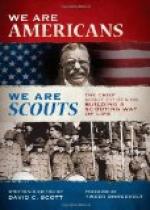I answered, “That is what we intended to do.”
She then burst into tears, and amid her sobs said, “We can never pay you for what you have done for us.”
At this moment the young girl appeared, and as she gave me her hand her mother said, “He is going to leave us, and we can never pay him for what he has done for us”; at this the girl commenced to cry too and it was some minutes before I could talk to them. When they had quieted down I said, “Ladies, you owe me nothing, I only done my duty, and I would do the same thing over again for you or any one else under the circumstances that existed.” Then the elder lady said, “If it hadn’t been for you we might never have seen a white person again.”
I asked her, what state they were from. She said they came from Wright country, Missouri, and that she had a brother there that was amply able to come and take them back, but she would not ask him to do so for she never wanted to cross the plains again. She said she had a few dollars left that the Indians didn’t get, and she thought Lizzie and she could find something to do to get a living. I gave them all the encouragement I could, bid them good bye and went back to Jim.
By the time dinner was ready Jim and I had our pack saddles and every thing ready to put on our horses. While we were eating dinner as many as thirty ladies came to us to inquire what they could give us to take with us to eat on our journey. I was amused at Bridger. After each lady had told what she had to give us, some had cakes, some had pie, and some had boiled meat and some had bread; Jim straightened up and said, “Why dog-gorn it ladies, we ain’t got no wagon and we couldn’t take one if we had one the route we are going which will be through the mountains all the way with no road or trail. We are going horse back and we can only take about a hundred pounds on our pack horses. Now, ladies, we are a thousand times obliged to you all but all we want is some bread and a little meat, enough to do us a couple of days, and then we will be where we can shoot all the meat we want; it is a poor hunter that could not get enough grub for himself in the country we are going through.”
The next morning when we were getting ready to start the women commenced bringing in bread and meat for us and we had to take enough to last us a week, we could not take less without hurting their feelings. When we were all ready to start, the whole company came to bid us “good bye.” Men and women, old and young, all came, and amid hand clasps from the men and tears and smiles from the women we mounted our horses and were off.
We followed the trail we had come, back as far as Truckey river, and just below where Reno stands now, we met the remnant of an emigrant train and according to their story they had had nothing but trouble from the time they struck the head of Bitter Creek until the day before we met them. They said they had lost twenty seven men and fourteen women and a number of cattle and horses. They were very much surprised when we told them of the train we had just piloted through to California without losing one that staid with us. We told them of the dreadful fate of old Mr. Lynch and his son.




